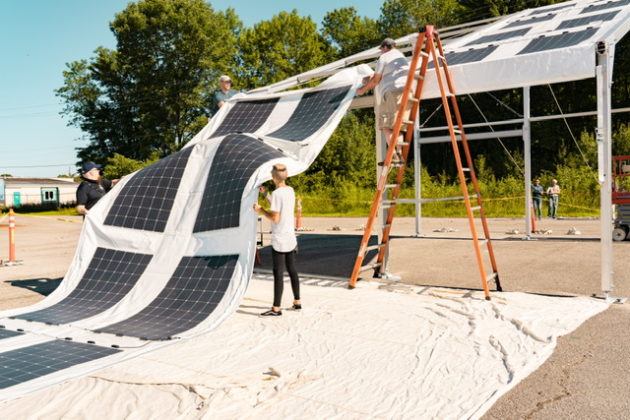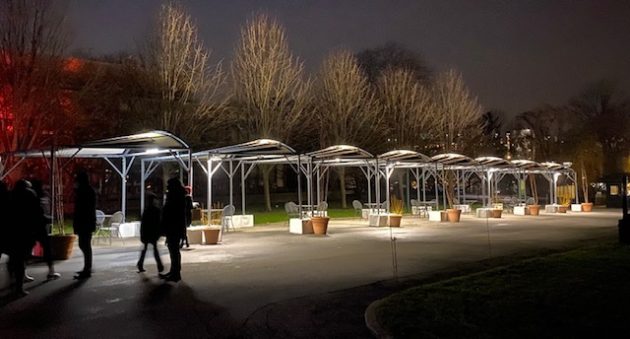One of this week’s more intriguing conversations centered on solar power from your canopy, awning, or tent with Pvilion CEO Colin Touhey.
Maybe in these post-Covid days of rediscovered al fresco dining, you may be able to have a fine meal under a tent with lighting and outlets to charge your mobile device powered by solar cells in the fabric of the tent. Or perhaps thinking of work, you need temporary coverage of an area for work or storage. And electrical power is required. Maybe many volts and amps. Same scenario. Pvilion products, er, cover a fascinating range of use cases. I’ve included a general background of Pvilion and its technology plus use cases from the New York Botanical Garden and a Home Depot location.

What is Pvilion?
(from an essay by Director of Marketing Jill Gettinger) Pvilion integrates solar cells into fabric, producing products that when exposed to the sun, generate electricity. Pvilion can take any surface that receives sunlight, cover it with this fabric and produce electricity, providing flexible structures that can be powered independent from the electricity grid.
The more technical name for Pvilion’s offerings is flexible photovoltaic (PV) solar fabric products and structures and behind the simplicity is a 10-year-old partnership between Colin Touhey, an electrical engineer and CEO of Pvilion, and fabric industry veterans Todd Dalland, a pioneering designer and inventor in the field of lightweight structures, and Robert Lerner, AIA, an architect who has led new technology development programs involving lightweight, deployable structures for NASA, the U.S. Army and the U.S. Air Force. The three connected when they were working on integrating photovoltaic cells with fabric for the U.S. Department of Defense.
Pvilion’s roots go back more than 20 years when Dalland and Lerner developed the first photovoltaic tent. That the tent was easy to deploy, flexible and self-powered piqued the attention of the military, which led to research and development funding from the U.S. Army.
Military deployments during this time further increased product demand as forward operating bases needed to be setup quickly in places where there was no grid, and it was difficult to setup up traditional power generators.
At the same time, mobile device usage, cell phones, laptops, handheld computers, was taking off. The mobile purpose of these devices meant they often needed to be powered where access to a traditional grid source was not available. To meet this need, Pvilion developed the Solar Sail, a small solar canopy that resembles a sail, hence the name, which can be easily deployed in public spaces and at outdoor gatherings, e.g., sporting events, concerts, parks, weddings,et cetera. Once deployed and receiving sun light, it generates power that can be tapped into to charge mobile devices.
Concern for the environment also came into play as solar power’s proven advantage over fossil fuels is that its use leaves no carbon footprint. As a result, environmentally conscious corporations and public entities, like schools, began installing Pvilion’s solar power canopy structures to meet both short- and long-term needs while avoiding the costs, environmental damage, and time associated with erecting and running permanent structures tied into the local power grid.
What started out as a solar powered tent has evolved into a product range covering standalone USB charging stations and easy to erect temporary structures, including canopies and awnings, all solar powered.
The easiest way to understand what Pvilion does is to look at one of its signature products: The Solar Sail Canopy, a free-standing canopy that can be erected anywhere that receives sunlight: parks, university campuses, bus stands or in any public setting, and used to recharge mobile devices. The Solar Sail Canopy is available in (3) versions: a Single Pole Solar Sail, a Double Pole Solar Sail that can be used as a solar powered shelter, e.g., over a bus stop or bench, and a portable Four Pole Canopy for seasonal applications that can be customized to suit an individual space requirement.
Sustainability At New York Botanical Garden

Aesthetic appeal is very important to The New York Botanical Garden (NYBG), which is why the NYC Department of Citywide Administrative Services (DCAS) chose NYBG as the launch site for Pvilion’s Solar Powered Canopy structures.
Intended to provide NYBG visitors a place where they can seek shade, enjoy a beverage and recharge their mobile devices, the eight (8) solar canopies, designed, engineered and installed by Pvilion, provide ample space to relax while staying safely socially distanced.
Pvilion provides a fabric that incorporates photovoltaic cells, which generate electricity upon exposure to the sun. As part of New York City’s emission reduction efforts, seven (7) of the canopies contribute energy directly to the city’s power grid. One (1) structure powers a bank of batteries used by NYBG and by Botanical Garden visitors to charge their mobile phones and other cellular devices.
The solar canopies are a pilot project operated by Pvilion and the Innovative Demonstrations for Energy Adaptability (IDEA) Program, an initiative of the City of New York’s Division of Energy Management. The program encourages businesses, innovators and entrepreneurs to create transformative opportunities and to foster a culture of innovation. The goal is to find solutions to the challenges facing manufacturers and businesses through partnerships with private sector business entities, with emphasis placed on technology to help the City reduce carbon emissions.
Pvilion’s Solar-Powered Fabric Products are fully turn-key solutions that provide energy in any location where fabric is exposed to the sun. Pvilion integrates its fabric technology into a wide range of applications. The technology eliminates the need of having two (2) separate systems: fabric shade/shelter and solar panels. Instead, Pvilion integrates the solar power into its fabric to achieve one turn-key product that provides charging, lighting, ventilation, climate control all in an easy to install manner. Pvilion has delivered high quality products for customers like Google, Tommy Hilfiger, Carnegie Hall, Tishman, New York City, Yale Univ, the Florida Dept of Transportation, Bloomberg, The City of Miami, FL and more.
Home Depot Pilot Program to Achieve Sustainable Energy
The Home Depot Rental Center in Geismar, Louisiana, a large industrial building and parking area, serves as the rental equipment preparation and distribution center to surrounding Home Depot stores. Here, equipment is prepared before being sent to Home Depot Superstores upon being rented by customers. The first of over one hundred rental centers planned to be opened throughout the country, Geismar is also the initial location for a Home Depot green pilot energy sustainability program in which Pvilion Solar Canopies will be used to recharge rental equipment batteries.
Pvilion developed and installed its signature product, the Portable Solar Sail Tent, at the Geismar, LA Home Depot. Effectively, a relocatable canopy integrated with solar panels; the Solar Sail can provide sustainable power anywhere that receives sunlight. It lets Home Depot charge its electric rental equipment independently from the local electric grid, eliminating the environmental impact associated with traditional sources of energy and the need to create permanent infrastructure.
The implemented 20 ft x 24 ft structure provides two (2) bays under an angled roof for maximum sun exposure. It is designed to withstand extreme weather conditions yet is flexible for speedy assembly/disassembly. It can provide up to 5 kW of energy and storage for up to five (5) full operational days of energy without sun. In addition to charging rental equipment, the energy provided by the Solar Sail can also be used to power other devices such as cell phones, laptops and lighting.






Hello there i am a student at LATTC Architecture program and would love to purchase some of this fabric if possible to create a solar canopy as a project